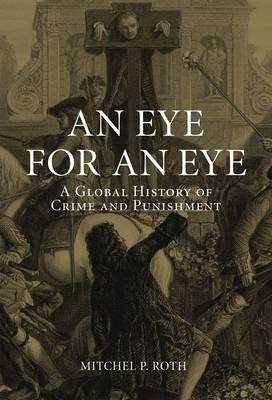
Wil je zeker zijn dat je cadeautjes op tijd onder de kerstboom liggen? Onze winkels ontvangen jou met open armen. Nu met extra openingsuren op zondag!
- Afhalen na 1 uur in een winkel met voorraad
- Gratis thuislevering in België vanaf € 30
- Ruim aanbod met 7 miljoen producten
Wil je zeker zijn dat je cadeautjes op tijd onder de kerstboom liggen? Onze winkels ontvangen jou met open armen. Nu met extra openingsuren op zondag!
- Afhalen na 1 uur in een winkel met voorraad
- Gratis thuislevering in België vanaf € 30
- Ruim aanbod met 7 miljoen producten
Zoeken
€ 34,95
+ 69 punten
Omschrijving
From "an eye for an eye" to debates over capital punishment, humanity has a long and controversial relationship with doling out justice for criminal acts. Today, crime and punishment remain significant parts of our culture, but societies vary greatly on what is considered criminal and how it should be punished. In this global survey of crime and punishment throughout history, Mitchel P. Roth examines how and why we penalize certain activities, and he scrutinizes the effectiveness of such efforts in both punishing wrongdoers and bringing a sense of justice to victims. Drawing on anthropology, archaeology, folklore, and literature, Roth chronicles the global history of crime and punishment--from early civilizations to the outlawing of sex crimes and serial homicide to the development of organized crime and the threat today of global piracy. He explores the birth of the penitentiary and the practice of incarceration as well as the modern philosophy of rehabilitation, arguing that these are perhaps the most important advances in the effort to safeguard citizens from harm. Looking closely at the retributions societies have condoned, Roth also look at execution and its many forms, showing how stoning, hemlock, the firing squad, and lethal injection are considered either barbaric or justified across different cultures. Ultimately, he illustrates that despite advances in every level of human experience, there is remarkable continuity in what is considered a crime and the sanctions administered. Perfect for students, academics, and general readers alike, this interdisciplinary book provides a fascinating look at criminality and its consequences.
Specificaties
Betrokkenen
- Auteur(s):
- Uitgeverij:
Inhoud
- Aantal bladzijden:
- 304
- Taal:
- Engels
Eigenschappen
- Productcode (EAN):
- 9781780233598
- Verschijningsdatum:
- 15/02/2015
- Uitvoering:
- Hardcover
- Formaat:
- Genaaid
- Afmetingen:
- 179 mm x 237 mm
- Gewicht:
- 693 g

Alleen bij Standaard Boekhandel
+ 69 punten op je klantenkaart van Standaard Boekhandel
Beoordelingen
We publiceren alleen reviews die voldoen aan de voorwaarden voor reviews. Bekijk onze voorwaarden voor reviews.











